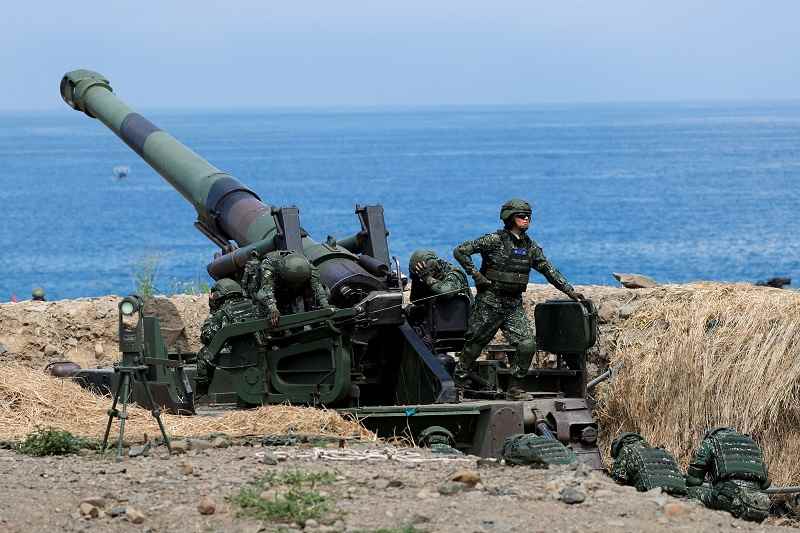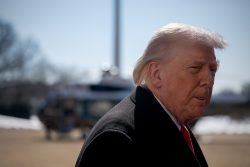
Female soldiers of an artillery unit take part in the live fire Han Kuang military exercise, which simulates China’s People’s Liberation Army (PLA) invading the island, in Pingtung, Taiwan on May 30, 2019.
14:37 JST, May 7, 2022
Chinese President Xi Jinping is watching his friend Russian President Vladimir Putin fumble Russia’s invasion of Ukraine and learning from Putin’s errors, senior U.S. military officials believe. And if China should ever decide to attack Taiwan, Xi will surely apply the lessons he has learned – which means we in the West must also quickly adjust our plans for Taiwan’s defense.
The Chinese government insists that the Ukraine and Taiwan situations are different and that China has no plans to attack the island it claims as its own. But the Taiwanese government correctly recognizes the overwhelming similarity between its situation and that of Ukraine: Both are small democracies menaced by aggressive, nuclear-armed dictatorships threatening to wipe them off the map.
But China has a key advantage that Russia didn’t. By not going first, Xi can easily avoid repeating Putin’s military blunders, and China also now knows the West’s playbook for responding. This has likely led Xi to adjust China’s plans for attacking Taiwan in at least four ways, according to Army Gen. Richard Clarke, the head of U.S. Special Operations Command, who spoke at the McCain Institute Sedona Forum on Saturday.
First, given that Putin failed to achieve his goal of conquering Ukraine in days, Xi is likely revising his plans to ensure that any invasion would begin by bringing down overwhelming force on Taipei and possibly other key Taiwanese cities.
According to Clarke, Xi is probably thinking to himself, “I’ve gotta do this fast. I have to accomplish this quickly, because the Russians did not. . . . And in order to accomplish it fast, I have to seize the capital city.”
Next, a Chinese attack on Taiwan would likely be a surprise. Xi would likely not repeat Putin’s months-long buildup of forces on his side of the line, because that gave the international community too much time to get organized, Clarke said. Third, Xi is also likely making moves to preemptively counter any economic sanctions or isolation the West might bring to bear as punishment after an attack, he said. Lastly, according to Clarke, Xi sees Putin losing the information war and therefore would likely spend more resources to control the information space before and after any attack.
The United States should change its strategy for the defense of Taiwan to take into account what China is likely learning in Ukraine, Clarke told the forum. Clarke wants the United States to help make Taiwan an “indigestible porcupine” by arming Taiwan’s military with weapons that have proved useful in Ukraine for repelling Putin’s invasion.
“We really have to look at, in the near term, how are we building up Taiwanese resistance and resilience?” said Clarke. “What are the real capabilities that we are making sure are in Taiwan in the coming months, not the coming years?”
One challenge is that these very weapons, such as Stinger antiaircraft missiles, anti-ship weapons and small arms for street fighting, are being sent to Ukraine faster than stocks can be replenished. Another is that the U.S. system for sending arms to Taiwan is slow and centered around large, traditional weapons systems such as tanks and fighter planes.
China can’t be the only country learning lessons from the Ukraine war and applying them to Taiwan, said Sen. Lindsey O. Graham (R-S.C.), who recently returned from a bipartisan trip to Taiwan. Taiwan must build a real civil defense force to enable the Taiwanese people to defend their homes – and the United States can help them, he told me.
More broadly, the best way to avoid a war in Taiwan is to convince China that the United States and its allies would not only come to Taiwan’s defense but also would be able to sustain aid to Taiwan’s military for a long fight, said Graham.
“For America to deter China, Beijing has to believe that there will be an endless supply of help to Taiwan,” Graham said.
That means moving more U.S. military and supply logistics into the Western Pacific now rather than waiting for an attack to begin. The United States should also help bolster the military capabilities of allies that might come to Taiwan’s defense, such as Australia and Japan. There are also growing calls on Capitol Hill for the Biden administration to modify the U.S. policy of “strategic ambiguity,” to remove suspicions in both Taipei and Beijing that the United States might not defend Taiwan.
“I want us to start being more clear about what we’re willing to do,” said Graham. “And if you say it, you better be willing to do it.”
It’s no surprise the Chinese government and its allies are now warning the United States against linking Taiwan to Ukraine or helping Taiwan counter Beijing’s ever-increasing intimidation. The Chinese government and its proxies claim (falsely) that China is neutral in the Ukraine crisis and that the real threat to peace across the Taiwan Strait is U.S. military assistance and diplomatic support.
The biggest mistake the West made in Ukraine was playing into this kind of propaganda by waiting until after Putin attacked to mobilize a real defense. For Taiwan, the time to arm the island and deploy the resources needed for rallying to its defense is now.
Top Articles in News Services
-

Prudential Life Expected to Face Inspection over Fraud
-

Hong Kong Ex-Publisher Jimmy Lai’s Sentence Raises International Outcry as China Defends It
-

Japan’s Nikkei Stock Average Touches 58,000 as Yen, Jgbs Rally on Election Fallout (UPDATE 1)
-

Trump Names Former Federal Reserve Governor Warsh as the Next Fed Chair, Replacing Powell
-

Suzuki Overtakes Nissan as Japan’s Third‑Largest Automaker in 2025
JN ACCESS RANKING
-

Japan Institute to Use Domestic Commercial Optical Lattice Clock to Set Japan Standard Time
-

Israeli Ambassador to Japan Speaks about Japan’s Role in the Reconstruction of Gaza
-

Man Infected with Measles May Have Come in Contact with Many People in Tokyo, Went to Store, Restaurant Around When Symptoms Emerged
-

Prudential Life Insurance Plans to Fully Compensate for Damages Caused by Fraudulent Actions Without Waiting for Third-Party Committee Review
-

Woman with Measles Visited Hospital in Tokyo Multiple Times Before Being Diagnosed with Disease























